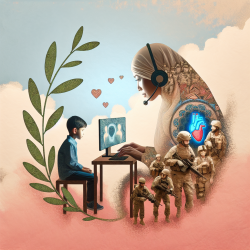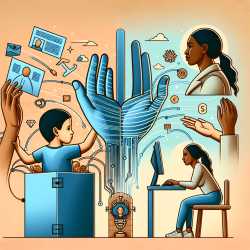As speech-language pathologists (SLPs) working with children, it is crucial to continuously improve our practice through data-driven insights. A recent study, "Help-seeking for mental health issues in deployed Canadian Armed Forces personnel at risk for moral injury," offers valuable lessons that can be applied to our work. This blog will explore the study's findings and suggest ways to implement these insights to enhance mental health support for children.
Understanding Moral Injury and Help-Seeking Behavior
Moral injury occurs when individuals experience events that transgress their deeply held moral beliefs, leading to feelings of shame, guilt, and psychological distress. The study found that military personnel exposed to potentially morally injurious experiences (PMIEs) were more likely to seek help from gatekeeper professionals, such as family doctors, and non-professionals, rather than specialized mental health professionals.
Key Findings
- Military personnel with PMIEs were more likely to seek help from family doctors/general practitioners (OR = 1.72; 95% CI = 1.25–2.36).
- Increased help-seeking from paraprofessionals (OR = 1.72; 95% CI = 1.25–2.36) and non-professionals (OR = 1.44; 95% CI = 1.06–1.95).
- Higher likelihood of seeking professional care from the civilian health care system (OR = 1.94; 95% CI = 1.27–2.96).
Implications for Speech-Language Pathologists
Although the study focuses on military personnel, the findings can be extrapolated to improve mental health support for children. Here are some actionable steps for SLPs:
1. Foster a Trusting Environment
Children, like military personnel, may be more comfortable seeking help from familiar and trusted individuals. Building a strong rapport with children and their families can encourage them to seek help when needed.
2. Collaborate with Gatekeeper Professionals
SLPs should collaborate with gatekeeper professionals, such as pediatricians and general practitioners, who are often the first point of contact for families. This collaboration can ensure that children receive timely and appropriate referrals to specialized mental health services.
3. Increase Awareness of Moral Injury
SLPs should educate themselves and their colleagues about moral injury and its impact on mental health. Understanding the signs and symptoms can help in early identification and intervention.
4. Utilize Paraprofessionals and Non-Professionals
Incorporating paraprofessionals and non-professionals, such as school counselors and peer support groups, into the support network can provide additional avenues for children to seek help. Training these individuals to recognize and respond to mental health issues can enhance the overall support system.
Encouraging Further Research
While the study provides valuable insights, more research is needed to understand the specific help-seeking behaviors of children and how best to support them. SLPs are encouraged to stay informed about the latest research and consider participating in studies that explore mental health support for children.
To read the original research paper, please follow this link: Help-seeking for mental health issues in deployed Canadian Armed Forces personnel at risk for moral injury.










